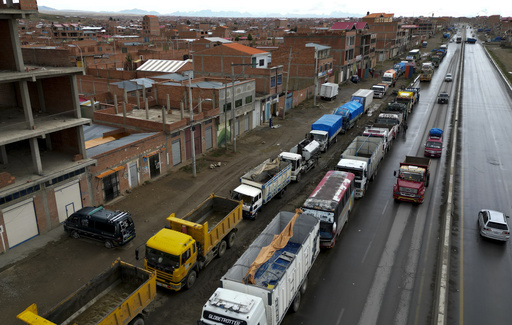
“`html
EL ALTO, Bolivia — Fuel is quickly becoming one of the rarest resources in Bolivia, as vehicles wait in lines stretching for several kilometers outside gas stations across the country, which was once the second-largest producer of natural gas in South America. In some locations, these queues remain stagnant for days on end.
As frustration rises, motorists like Victor García have taken to eating, sleeping, and socializing beside their immobile trucks, all while they anticipate the opportunity to purchase a few gallons of diesel—should the station not run out first. “We don’t know what’s going to happen, but we’re going to be worse off,” lamented García, 66, who made slow progress toward the pump on Tuesday as he waited in El Alto, a modest expanse adjacent to Bolivia’s capital in the Andean highlands.
This lasting fuel shortage coincides with a drastic drop in the nation’s foreign currency reserves, leaving citizens struggling to access U.S. dollars from banks and currency exchanges. Imported items that were once readily available have become increasingly hard to obtain.
The fuel dilemma has sparked a widespread sentiment of disorder, disruptively affecting economic activities and daily life for millions, hampering commerce and agriculture while driving food prices up significantly.
Growing public resentment has led to protests in the streets, with many calling on leftist President Luis Arce to alleviate the hardships faced by citizens as the country approaches a challenging election year. “We want effective solutions to the shortage of fuel, dollars, and the increase in food prices,” remarked Reinerio Vargas, the vice rector of Gabriel René Moreno Autonomous University located in the eastern province of Santa Cruz. On Tuesday, hundreds of frustrated truck drivers and locals gathered in main squares to voice their anger over Arce’s inaction and demand early elections.
Similar expressions of frustration were evident last week when protesters, exclaiming “Everything is expensive!” marched through the streets of La Paz, the capital. Many Bolivians believe that Arce’s reputation has suffered not only due to the fuel crisis but also because his government refuses to acknowledge its severity.
“Diesel sales are in the process of returning to normal,” stated Economy Minister Marcelo Montenegro on Tuesday. However, Arce has consistently promised that his administration will resolve the fuel shortages and reduce basic goods prices by given deadlines. On November 10, he again claimed he would resolve the issue in ten days.
As deadlines pass without resolution, the rate for black market currency exchanges has soared to nearly 40% above the official rate. Arce’s office did not respond to requests for interviews.
“The queues are getting longer and longer,” complained Ramiro Morales, a 38-year-old driver who endured four hours in line on Tuesday and felt the urgency to find a restroom but was reluctant to abandon his spot. “People are exhausted.”
This dramatic decline is striking for a landlocked country of 12 million that was once a beacon of economic success in South America during the 2000s, when a commodities boom brought in tens of billions of dollars under the leadership of Evo Morales, the nation’s first Indigenous president and Arce’s former mentor and current rival for the ruling party’s candidacy in the upcoming election.
When the commodities surge ended, gas production fell sharply, resulting in Bolivia’s current situation where it spends around $56 million weekly importing most of its fuel from Argentina, Paraguay, and Russia.
During a speech on Tuesday, Economy Minister Montenegro assured that the government would maintain fuel subsidies, a move criticized as unsustainable long-term.
Old banners from two years ago touting Bolivia’s status as having the lowest inflation rate in South America still welcome visitors at El Alto International Airport. In stark contrast, inflation is now among the highest in the region.
Fuel shortages have impeded farmers’ ability to transport their goods to market, triggering sharp increases in staple food prices. Recently, hungry citizens in La Paz and nearby El Alto scrambled in long lines to acquire rice after delayed shipments finally reached them from Santa Cruz, Bolivia’s economic heart located roughly 850 kilometers (528 miles) away.
With the diesel deficit impacting agricultural operations, including tractor functions and machinery part availability, farmers find themselves hindered during this critical planting season. “Without diesel, there is no food for 2025,” warned Klaus Frerking, vice president of the Eastern Agricultural Chamber of Bolivia.
Prices for essential items like potatoes, onions, and milk have reportedly doubled within the last month in El Alto’s primary wholesale food market, far exceeding the country’s nearly 8% inflation rate.
As a result of the situation, many Bolivians are curtailing their consumption. “You have to search a lot to find the cheapest food,” expressed 67-year-old Angela Mamani, who struggled to gather meals for her six grandchildren at El Alto’s open-air market on Tuesday. She aimed to purchase vegetables but returned home empty-handed due to a lack of funds.
This week, Arce’s administration proposed a 2025 budget that included a 12% rise in spending, sparking criticism from lawmakers and business leaders who argue it would exacerbate debt and inflation issues.
Amidst an internal struggle for power between Arce and Morales, the governing Movement Toward Socialism party has seen economic challenges turned into political leverage in anticipation of the 2025 elections. “They deny there are problems. They blame external contexts and conflicts,” stated Bolivian economic analyst Gonzalo Chávez.
Last month, Morales’ supporters initiated a 24-day protest primarily against Arce’s economic management, which obstructed critical routes and stranded commercial shipments, resulting in significant losses for the government. Although security forces dissolved the rallies a month ago, the administration continued to attribute the ongoing fuel shortages to these protests.
“We need change,” said Geanina García, a 31-year-old architect who was searching for bargains at the El Alto grocery hub—a routine errand that has recently turned into a rather challenging task. “People don’t live off politics; they live day to day, off of what they produce and what they earn.”
“`
